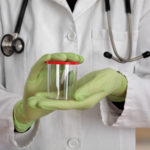 Mobile health has advanced considerably in recent years, with not only a growing number of apps available to monitor everything from mental health to diabetes, but also a range of add-ons to perform a wide range of examinations and diagnostic tests.
Mobile health has advanced considerably in recent years, with not only a growing number of apps available to monitor everything from mental health to diabetes, but also a range of add-ons to perform a wide range of examinations and diagnostic tests.
New research from Vanderbilt University underlines the potential for smartphones to empower powerful diagnostic testing. The paper describes how silicon chips can be coated onto special film, and when photographed by a smartphone used to detect everything from drugs in our blood to bacteria in water.
The team developed nanostructured thin film strips that can be produced at very low cost, and then paired them up with an every day smartphone app to provide easy and cost effective diagnostic testing in a wide range of scenarios.
“Most people are familiar with silicon as being the material inside your computer, but it has endless uses,” the researchers explain. “With our nanoscale porous silicon, we’ve created these nanoscale holes that are a thousand times smaller than your hair. Those selectively capture molecules when pre-treated with the appropriate surface coating, darkening the silicon, which the app detects.”
Smart diagnostics
Traditionally, testing of this kind of quality has relied upon expensive bits of hardware that work alongside a smartphone, but the researchers believe their system is a robust and significantly cheaper alternative. It uses the flash built into the phone as a light source, with an app then performing the data processing to ensure the correct procedure was followed.
The device is still at a very early stage, but the team are confident that it could eventually replace devices like a mass spectrometer, which typically retails for several thousand dollars, with hundreds in operation in areas such as airports around the world.
The initial system was tested with the iPhone SE, with the accuracy of results comparable to those produced by benchtop measurement systems. It’s a fascinating technology, and you can see it in action via the video below.